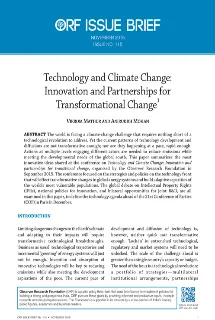Limiting dangerous changes to the Earth’s climate and adapting to their impacts will require transformative technological breakthroughs. ‘Business as usual’ technological trajectories and incremental ‘greening’ of energy systems will just not be enough. Invention and absorption of innovative technologies will be key to reducing emissions while also meeting the development aspirations of the poor. The current pace of development and diffusion of technology is, however, neither quick nor transformative enough. ‘Lock-in’ in entrenched technological, regulatory and market systems will need to be unlocked. The scale of the challenge ahead is greater than a single country’s capacity or budget. The need of the hour is a technological revolution: a portfolio of strategies%multilateral institutional arrangements, partnerships between developed and emerging nations, cooperation between the public and private sectors and the setting up of national frameworks for innovation will be needed to create an ‘ecosystem’ for development and diffusions of new climate-relevant technologies.
Any agreement on nationally determined emission reduction targets at the 21st Conference of Parties (COP 21) scheduled for December in Paris will be only the beginning of a global response to climate change. A slew of policies promoting climate-friendly technologies will need to be introduced to not only tackle climate change but also support development. Policies targeting innovation and diffusion of so-called ‘green’ technologies have the added advantage of appealing to many traditional concerns of national governments, such as those around energ y security, energ y efficiency and environmental protection. Mitigation tends to dominate the climate policy agenda, including that for technology. But adaptation technologies are equally critical. Coping with the impacts of climate change that are being felt currently and will be felt in the future will require major technology breakthroughs in areas such as agriculture, disaster management, health, and human habitation.
The views expressed above belong to the author(s). ORF research and analyses now available on Telegram! Click here to access our curated content — blogs, longforms and interviews.

 PDF Download
PDF Download



 PREV
PREV


